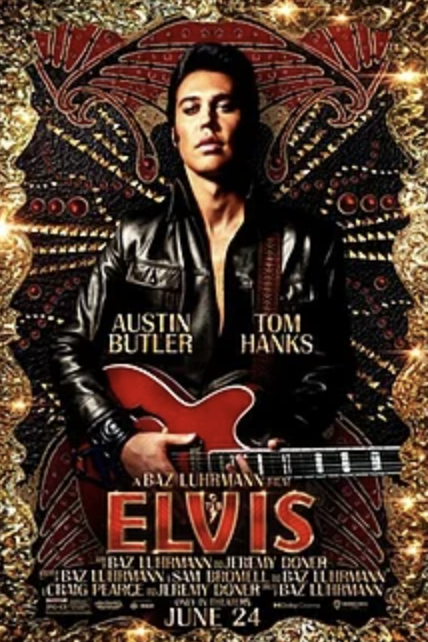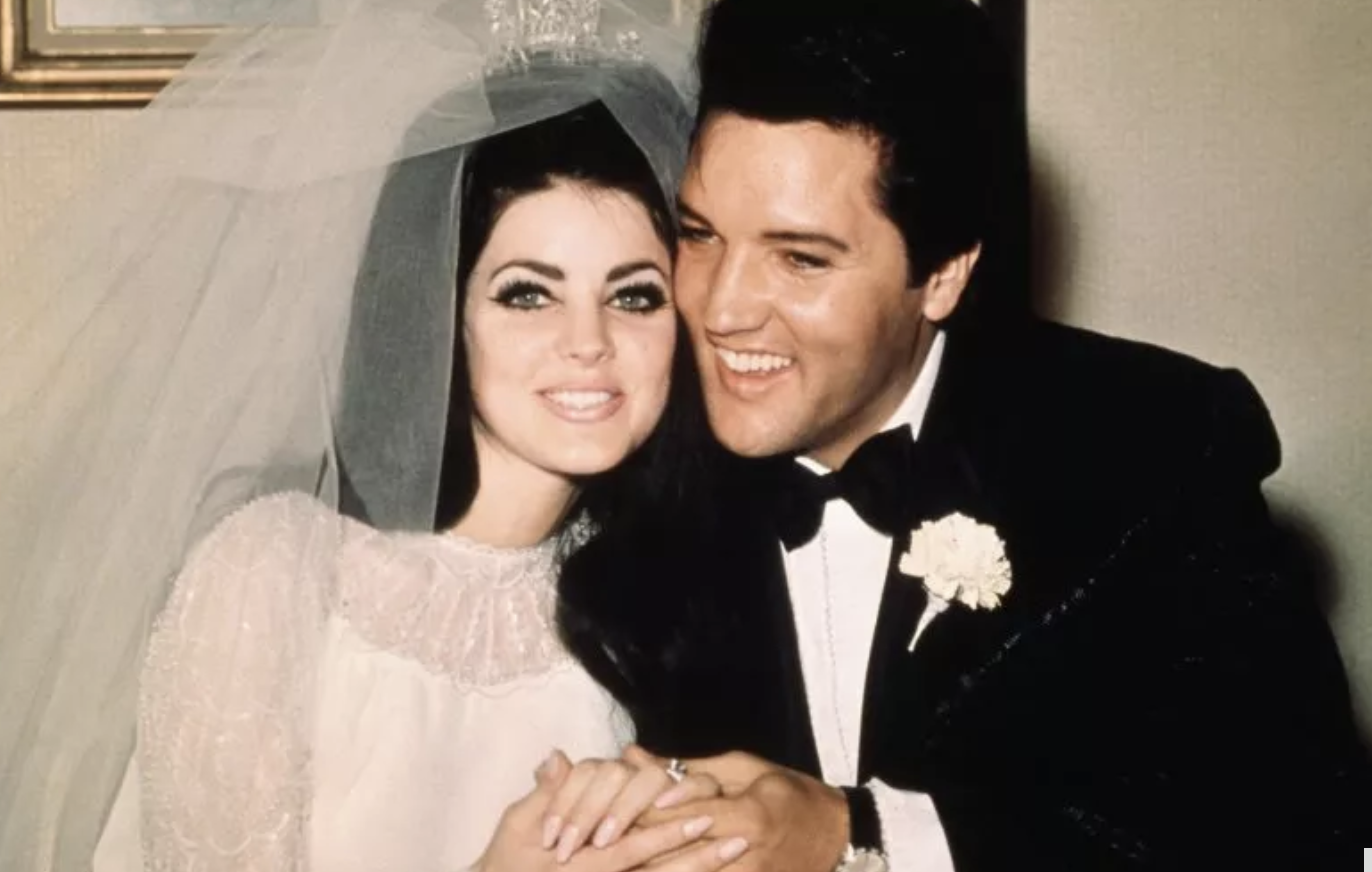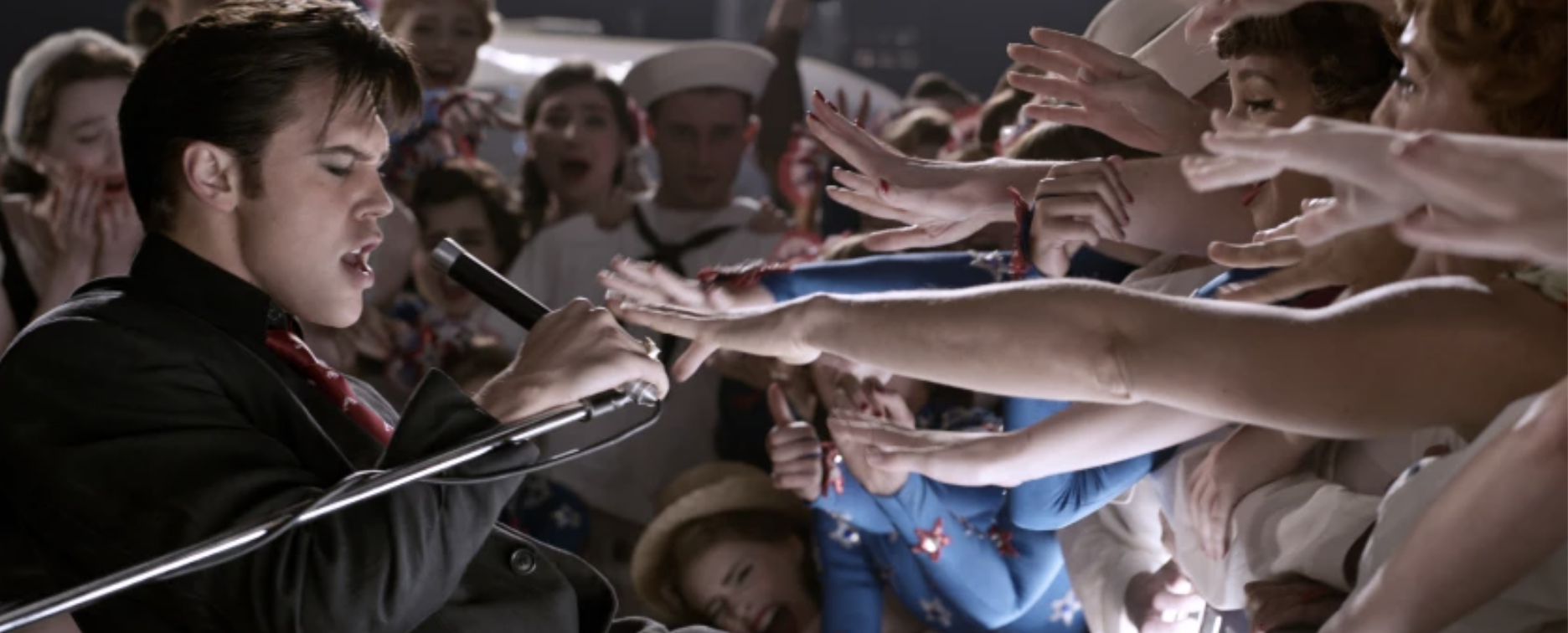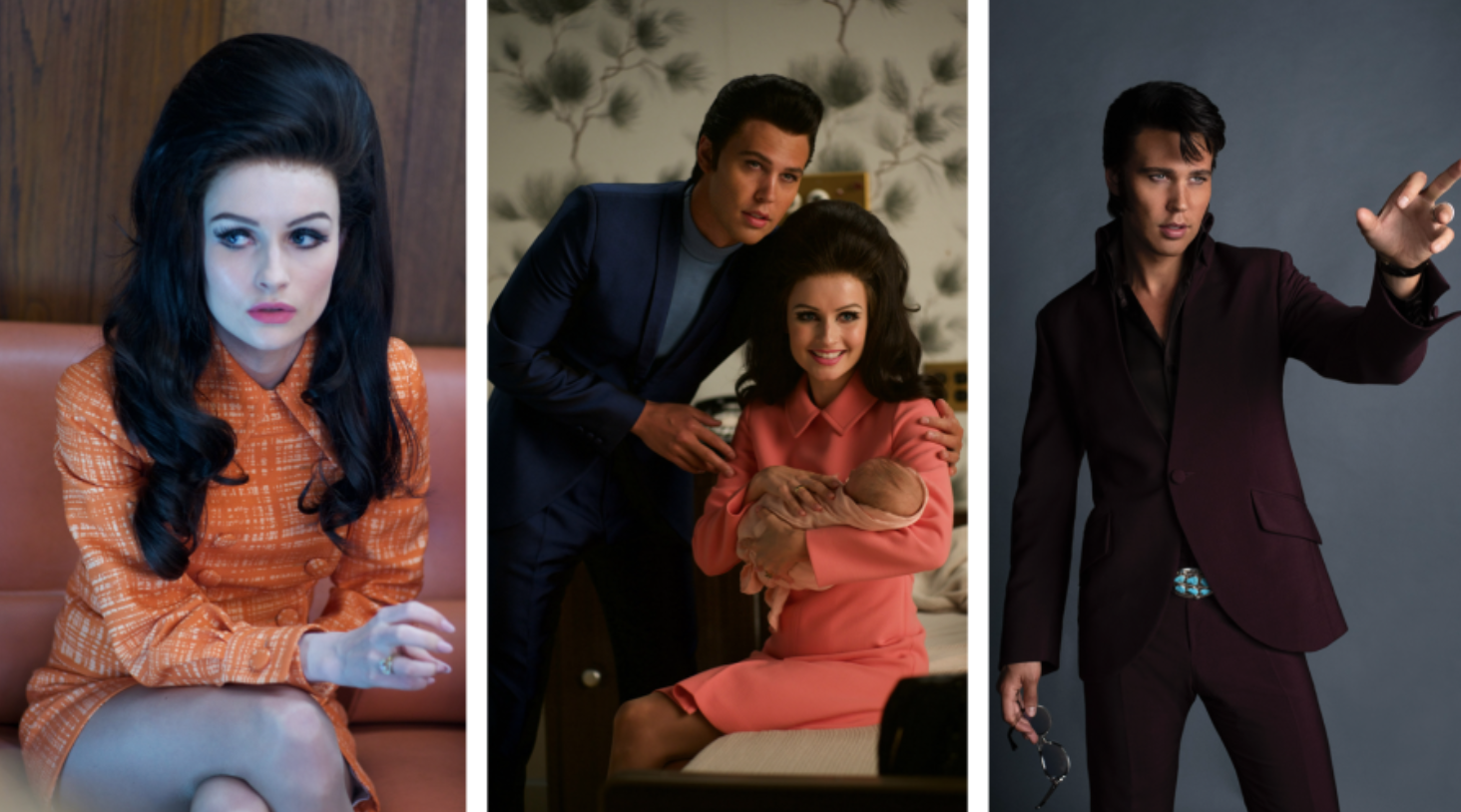Riding the ‘Elvis’ Movie Rollercoaster: Pelvises, Priscilla, Pills and Prosthetics.
Leaving the theater after watching “Elvis” yesterday was exhausting.
Not because the movie was a good two hours and 39 minutes long and ended precisely at 1 a.m.; the new “Elvis” movie is physically, emotionally and wholeheartedly exhausting.
Starring Austin Butler as Elvis Presley and Tom Hanks at his lifelong manager, Colonel Tom Parker, the “Elvis” biopic follows Presley along his rise to fame and the myriad of ways in which he was bamboozled by Col. Parker.
In roughly two and a half hours, the movie hits rock bottom around three times, includes four sky-high moments, and countless feelings of grief and joy constantly taking their turns. Watching “Elvis” is like riding a pill-infused rollercoaster with the best blues music you’ve ever heard and plenty of amazing costumes.
Shake, Rattle and Rollercoaster
Elvis Presley to this day is the top earning solo recording artist in the world. Turns out he had to perservere his way to the top as the rollercoaster of Elvis’ career has plenty of turns, a lot more downs than ups, a crap ton of loop de loops and even a few stops.
The Baz Luhrmann film follows Presley as he moves from his original label, Sun Records, to RCA Records with the help of his manager, Colonel Tom Parker, who first scouted Elvis at a carnival. From that point on, the audience gets to ride along for all the ups and downs it takes to turn Elvis Presley into a sensational star from the lonely boy who grew up in an all-black community.
Presley’s love of music stemmed from growing up listening to the gospel and blues he heard living in a primarily African American community in Memphis, Tennessee. The movie, through its cinematography, transports the audience back in time through the quick camera movements and shoulder-shaking blues background music. It’s not hard to understand how one could’ve gotten so physically and emotionally passionate for this kind of music, and even harder to stop yourself from foot tapping in the theater.
During Elvis’ life, he experienced internal and external struggles as an artist. Elvis faced backlash and even got sent to the United States Army for his music style and the shaking of his “Elvis Pelvis,” on stage. Once Elvis was deported to Germany, his mother died suddenly. This was devastating to Elvis as his mother was someone he had intense love and devotion for. Elvis was also stripped of his roots when the government thought his performances were too shocking and provocative. The list goes on, but the movie documents each struggle and each victory with a rapid pace, making the audience feel as though you are on the topsy-turvy journey with him. And it’s an exhausting one!
It's not only exhausting to watch Elvis’ battle with himself and addiction alongside the world, as the 60’s was a time of segregation and civil rights unrest. Throughout the movie you can see how Elvis brought the soul of African American music styles to white people and it succeeded, because he was white and lacked the same barriers to commercial success. Though the way he shook, jiggled and gyrated his pelvis all over the stage was incredibly shocking to the times, it gave life to a community that wasn’t able to shine on stage during this time period. Elvis was greatly affected by the deaths of Martin Luther King Jr. and the assassination of Bobby Kennedy, therefor singing an “activism song” in front of millions of Americans on television.
Elvis Presley was sexy, provocative, handsome, charming and most importantly, all in. The way the camera moves throughout the film reflects the quick speed to fame for Elvis, as well as his performance style. With every stage show, Elvis gets more intense, flinging sweat everywhere, kissing women from on-stage, moving in ways people at this time didn’t know a man could move. The way Luhrmann filmed “Elvis” creates an intimacy as if you were with the man himself, and by the end of each performance scene, just like the on-screen audience, you feel equally sweaty and fatigued.
Blue Suede Shoes by Prada and Miu Miu
A movie about a 60’s rock star is going to have amazing costumes. “Elvis” takes honors for the best costumes in films as of recent. The costumes were designed by Prada and Miu Miu, two brands very notorious for their high-fashion, clean-cut styles. The two designers were an amazing choice for “Elvis,” as the costumes perfectly transformed the actors into the glitz and glamour of Elvis’ life as a rock star.
Especially during his Vegas years, the outfits were colorful and glitzy, featuring jumpsuits, matching sets, glitter and the massive rocks Elvis and his squad wore on their fingers. Every outfit on Elvis and especially Priscilla reflected an All-American rock and roll family. Priscilla’s progression throughout the movie was reflected not only in her outfits, but also through her hair, which lightened and shortened as the movie went on. You feel as though you are transported back into time when Elvis was alive and rocking throughout America—thanks to his manager who refused to go abroad (presumably because he was a fraud and had no passport).
Elvis’ suit jackets and matching pants sets were perfectly curated to fit the time period and the timeline of his career. The colors in “Elvis” help the audience transport into a time of high-fashion, cutting-edge designs with very opaque colors like pinks, baby blues and bright whites splattered with gems.
Elvis’ outfits were directly related to his performances, as he could only perform in suit jackets with just the last button buttoned to allow his rolls, shakes and arm circles. It’s kind of hard to imagine real Elvis performing hours of high-energy performances with such heavy-looking jackets and studded-belts, but it sure would explain the gallons of sweat dripping from every inch of him.
Priscilla, What Do You Want Me To Do?
Most movies about the rise to fame of celebrities follow the concept of stars not wanting to change the way they are after getting incredibly famous. Elvis is further example that fame is a driving force of change and we see that in his romantic relationship with Priscilla Presley.
Priscilla, played by rising Australian star Olivia DeJonge, was Elvis’ only wife and is still alive today. Although the relationship ultimately ended in divorce, their love story is a whirlwind of passion, rock and roll, turbulence and eventually, dismay.
Priscilla stood by Elvis throughout most of his career, even as he kissed fans during shows, got addicted to pills and slept with women in his hotel room. During the movie at his first show in Las Vegas at the International Hotel, Elvis kissed a woman right in front of the seat that held Priscilla. The kiss not only invoked anger in the audience, but it was a transitional moment for Elvis, as he began to love his fans and music more than the people closest to him.
Priscilla checked out of her own personal heartbreak hotel—their marriage—in 1977, taking with her their only child, Lisa Marie Presley, who Elvis named his private plane, “Lisa Marie,” after.
Like most biopics, some of the most undesirable aspects of Elvis’ marriage were methodically left out. Starting with the fact that when Elvis and Priscilla met while he was in the army at a party in Germany, he was 24 and Priscilla… 14. A scene in the movie depicts them at this party sharing a kiss. Their true age was probably a good detail to leave out.
The movie doesn’t exclusively follow their relationship, which extenuated Elvis’ focus he had for performing and music, however their relationship showed a side of Elvis the public never got the chance to see. Him breaking down in tears once Priscilla left him, and his unconditional love for his daughter, were just a few of the tender sides the junk shaking rock singer never brought with him on stage.
Jailhouse Rock-ing Prosthetics
There is not much to critique in the new “Elvis” film. Butler’s role-playing Elvis has been greatly admired, as he perfectly embodied the facial expressions, movements and even the voice—which the actor can’t seem to drop—just as the rock and roll star was known for. However, Hanks’ role as Colonel Parker seemed to fall short…right at his face.
To achieve the perfectly replicated look of Elvis and Colonel Parker aging, the “Elvis” makeup department had to come up with some complex facial prosthetics. You can see in the final musical number how well Butler’s method acting and prosthetics work together to replicate the stiffness and puffiness in Elvis’ face from exhaustion and drug addiction.
Not so much for Hanks, as his prosthetics seemed a little obvious and prevented a lot of his expressions to shine through the fat suit. Hanks face hardly moved throughout the entire film, at times making it difficult to understand the character’s emotions as he was confronted with managing Elvis—defrauding him along the way.
Also, it’s noted that there are times where Hank’s accent playing Parker came and went. The accent, a blend of Dutch and southerner, was an interesting one and combined with a near emotionless face, it was hard to read his expression and tone sometimes. Hanks sometimes seemed to lose the perfected accent during scenes, which felt inauthentic and distracting.
“Elvis,” An Emotional, Physical and Mental Rollercoaster
“Elvis” is a blast to the past at lighting speed. It’s an incredibly emotion-provoking movie following the triumphs, the addiction, the heartbreak, the glitz, the terror and everything that shaped Elvis into the forever king of rock and roll music.
The movie is also raw, showing the audience that the The King also dealt with some serious roadblocks and issues in his life. As popular culture remembers his life and legacy in music, we can say for certain that Elvis Presley’s passion for soul and blues will continue to shake and jiggle America forever.










